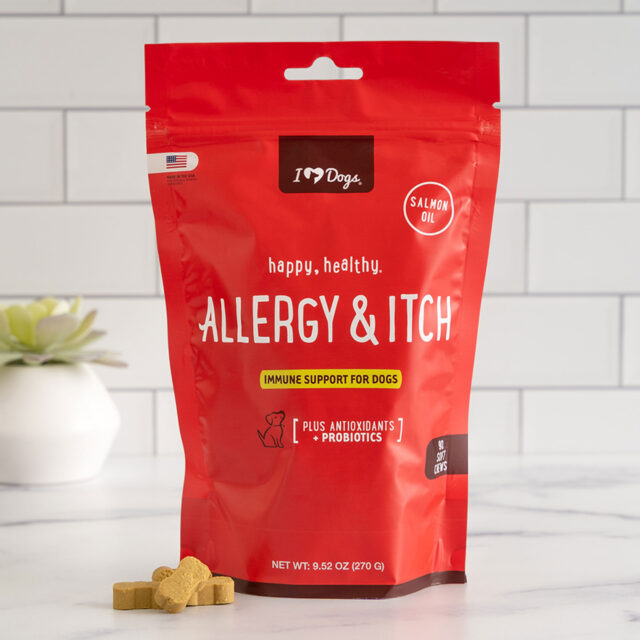Allergies are a common issue that most pet parents have to deal with at some point. Finding a remedy can be frustrating for you, and the itchiness is incredibly uncomfortable for your pooch. Luckily, plenty of remedies can control your canine’s irritation, such as quercetin for dogs.
Related: Looking for the Best Quercetin Supplements for Your Dog? Read Our Reviews
Some people refer to quercetin as “nature’s Benadryl” because it can naturally soothe your pup’s allergy symptoms. So, what is quercetin, and how can it improve your furry friend’s life?

What is Quercetin?
Quercetin is a flavonoid that comes from many plants and fruits, including apples, onions, green tea, and red wine. Some healthy human foods for dogs that include it are blueberries, kale, and broccoli. It’s a plant pigment, so that’s why most of the foods it’s found in have vibrant colors.
This flavonoid is best known for its anti-inflammatory properties, so it’s commonly used in supplements for both humans and pets. It can also function as a natural anti-histamine and anti-oxidant. It’s typically taken to reduce allergy symptoms, but some humans take it because it may improve their endurance.
Is Quercetin Safe for Dogs?
Yes, quercetin is safe for dogs because it provides them with several benefits while also having minimal side effects. However, there isn’t enough research to confirm if it’s safe for pregnant dogs, newborn puppies, or dogs with kidney disease. It’s always good to talk to your vet before adding a new ingredient or supplement to your dog’s diet.
Since quercetin is called “nature’s Benadryl,” it can often be used in the place of drugs like Benadryl. Quercetin may not act as quickly as a medication because it’s a natural option that’s easier for dogs to handle. So, you’ll need to be patient to see if it positively affects your pet.

Quercetin Benefits for Dogs
If your dog is suffering from allergy symptoms, quercetin may benefit them. Yet, they may experience other benefits too. So, here are some ways that this ingredient can help give your dog a better life.
Relieves Allergy Symptoms
Quercetin’s most common benefit is allergy relief. When your dog comes into contact with an allergen, its body creates chemicals called histamines. Histamines trigger allergic reactions in your dog’s body and cause them discomfort when they interact with pollen, dust, certain foods, or other allergens. Usually, dogs will experience sneezing, watery eyes, runny nose, or itchy skin when histamines are released.
Luckily, quercetin is an antihistamine. So, it slows the production of histamines in the body to reduce allergic reactions. It also has anti-inflammatory properties, which will make your dog swell and itch less when exposed to allergens. However, if your dog’s allergies are related to something that can be removed from their life, such as an ingredient, you should do that in addition to giving quercetin.
Benefits Respiratory Issues
Histamines are also released if a dog faces respiratory issues like an asthma attack. So, quercetin can lessen the histamines created due to asthma, along with leukotrienes, which are a similar immune system response. Leukotrienes can produce extra mucus and narrow your dog’s airways, making it harder for them to breathe. So, quercetin supplements can fight both those uncomfortable chemicals in the body.

Has Cancer-Fighting Properties
Quercetin may even be able to fight cancer and other severe conditions. It’s full of antioxidants, so it can neutralize free radicals, which will prevent diseases as a result. An excess of free radicals can cause oxidative stress and damage parts of the body like fatty tissue, proteins, and DNA. Too much damage can lead to premature aging, diabetes, and even cancer.
A paper from the University of Maryland Medical System states that quercetin can slow the growth of breast, colon, prostate, ovarian, and lung cancers. Cancer often feeds off of other types of inflammation in the body, so your dog will have a reduced risk of cancer by reducing inflammation. With quercetin’s anti-inflammatory properties, blood flow to the cancer cells will slow down to stop them from growing.
While fighting more serious conditions, quercetin may also help reduce bone loss, improve heart health, avoid periodontal disease, and maintain a healthy weight. So, even though it’s primarily used for allergies, it can provide a health boost in many areas of your dog’s body.
Allergy Symptoms in Dogs
Many dogs face allergies, but some have more severe symptoms than others. Most canine allergies are caused by seasons changing, reactions to bug bites, or sensitivities to certain foods. Removing exposure to the allergen may be able to solve the problem, but that’s not always an option. For example, food allergies can be removed from a dog’s diet, but seasonal allergies are difficult to avoid.
If your dog is showing any of the following symptoms, it may need a quercetin supplement:
- Itching/scratching
- Swelling near face, mouth, eyes, or ears
- Red, irritated skin
- Sneezing
- Excessive licking
- Hair loss
- Ear infections
- Runny nose
- Eye discharge
- Diarrhea or gas
Allergens can infect dogs if they inhale, consume, or even absorb them through their skin. If you notice your dog experiencing any of the above symptoms, especially if it’s for a long time, contact your vet. They can help you figure out what’s causing the reaction. Once you get to the root of the problem, you can decide what the best solution will be.
Related: 10 Best Mushrooms for Dogs

If your dog experiences a sudden extreme allergic reaction, immediately take them to the vet. Unexpected allergy symptoms could be caused by an insect bite, vaccine, or drug. Sudden allergic reactions like those are often too serious to be cured with a supplement and require a more proactive approach recommended by a vet.
Quercetin Dosage for Dogs
If you purchase a canine supplement with quercetin, the dosage will be listed on the container. You may want to start with a lower than suggested dose if you’re unsure how your dog will react to it. Then, gradually work your way up to a regular dose if no side effects occur.
Most dogs will take 5 to 10 milligrams of quercetin per pound of body weight. Those doses should be given twice a day, either an hour before or a few hours after meals. Again, the exact dose and instructions will vary significantly based on the type of product you choose. You also may need to adjust the dosage based on the concentration of quercetin in a product.
If you’re unsure what dosage is safest for your dog, you can talk to your vet about the product you’re planning to use. They can suggest a proper dose based on your dog’s age, weight, and medical history. It’s always a good idea to be cautious when starting your furry friend on a new medication or supplement.
Quercetin Side Effects
Quercetin has minimal side effects for dogs, but high doses of any substance can cause problems. If your dog takes too much quercetin, it may experience an upset stomach, headaches, or a reduced appetite. Drowsiness, kidney damage, or an increased heart rate may also occur. Dogs experiencing side effects may benefit from taking the supplement with the meal rather than before or after because they won’t be consuming it on an empty stomach.

If your dog has any unusual behaviors after taking quercetin for the first time, contact your vet. Even though quercetin is safe for dogs, it’s always better to be safe than sorry when dogs experience side effects. Your vet may suggest a more suitable allergy supplement for your pup.
Are There Any Drug Interactions?
The following drugs could cause an adverse reaction if given with quercetin:
- Tramadol
- Amitriptyline
- Ondansetron
- Omeprazole
- Piroxicam
- Fluoxetine
- Blood pressure medications
Before giving your dog a quercetin supplement, inform your vet of any other medications your dog is on. If needed, your vet can suggest a safer alternative based on the drugs your dog regularly takes.
What Happens if You Miss a Dose?
Quercetin supplements work best if you give them to your dog around the same times each day. If you miss a dose, give it to your pup as soon as you remember. However, if you remember too close to their next dose, you’ll be better off skipping that dose and waiting until the next one. Missing one dose is safer than accidentally overdosing.

Where Can I Buy Quercetin for Dogs?
Most pet supply stores carry supplements containing quercetin either in-store or online. These supplements most commonly come in pills, tablets, or chews, but you may be able to find them in liquid or powder forms as well. If the supplement doesn’t smell appealing to your dog, you may have to hide it in a treat to get your pup to take it.
Some quercetin products for humans may be effective for dogs, but it’s best to stick to pet-specific supplements if possible. Human supplements may contain ingredients that aren’t safe for canine consumption, so it’s better to stick with consumables you know are pet-friendly.
Foods that include quercetin, such as blueberries and kale, can be beneficial for your dog. However, on their own, they don’t contain enough quercetin to cause a significant change in your dog’s allergy symptoms. Some human foods containing quercetin can be healthy snacks for dogs, but they won’t have as many positive effects as a supplement would.
There are many quercetin supplements out there, so take your time choosing the best one. Look closely at the ingredients to help you decide if they will be safe and effective for your canine’s needs. When in doubt, discuss products with your vet to help you make an educated decision.
Allergy Relief for Picky Pups
If you have a picky eater, choosing a supplement can be complicated. One option to consider is the iHeartDogs Allergy & Itch Relief for Dogs. These allergy supplements come in chewable tablets that look and smell like dog treats. So, most dogs will gobble them up without realizing that the chews reduce allergies, boost the immune system, and improve digestive health.
Quercetin is one of the main ingredients in these supplements, but they also include colostrum, reishi mushrooms, salmon oil, apple cider vinegar, and licorice root. These ingredients help boost your dog’s immune system to reduce their allergy symptoms. Plus, every bag sold provides 14 healthy meals to shelter dogs. So, you’ll be helping out dogs in need while also improving your dog’s life!
Itching and scratching are no fun for anyone, so your dog shouldn’t have to experience them continuously. Ingredients like quercetin can help relieve your canine’s discomfort, so consider giving them an allergy relief supplement to help them feel their best.
- Best Joint Supplement for Dogs
- Best CBD Gummies for Dogs
- Goat's Milk for Dogs
- Skin & Coat Supplements for Dogs
- Weight Gain Supplements for Dogs
- Muscle Building Supplements for Dogs
- Heart Supplements for Dogs
- Multivitamins for Dogs
- Pill Pockets for Dogs
- Digestive Enzymes for Dogs
- Turmeric for Dogs
- Liver Supplements for Dogs
- Tear Stain Supplement for Dogs
- Breath Fresheners for Dogs
- Kidney, Urinary, & Bladder Supplements for Dogs
- Stool Eating Deterrent for Dogs
- Eye Supplements for Dogs
- Melatonin for Dogs
- Apple Cider Vinegar for Dogs
- Green Lipped Mussels for Dogs
- L Theanine for Dogs
- Chondroitin Supplements for Dogs
- MSM for Dogs
- Valerian Root for Dogs
- Chamomile for Dogs
- Boswellia for Dogs
- L Tryptophan for Dogs
- Yucca for Dogs
- Licorice Root for Dogs
- Bromelain for Dogs
- Papain for Dogs
- Devil's Claw for Dogs
- Quercetin for Dogs
- Hemp gummy for dogs
- Best Hemp Dog Treats
- Best Hemp Oil for Dogs
- Best Calming Treats, Chews, & Supplements for Dogs
- Best Bone Broth for Dogs
- Best Fish Oil for Dogs
- Best Probiotics for Dogs
- Best Hip Dysplasia Supplements for Dogs
- Best Colostrum for Dogs
- Best Quercetin for Dogs
- Best Greens for Dogs Supplements
- Best Vitamin C Supplements for Dogs
- Best Probiotic for Dog with Allergies
- Best Taurine Supplements for Dogs
- Best Dog Food Toppers
- Best Anal Gland Supplement for Dogs
- Best Dog Probiotic Powder
- Best CoQ10 Supplement for Dogs
- Best Liquid Glucosamine for Dogs
- Best Wrinkle Creams, Balms, and Wipes for Dogs
- Best Puppy Calming Treats
- Best Colloidal Silver for Dogs
- Best Adaptogen Supplements for Dogs
- Best Cognitive Supplements for Dogs
- Best Bee Pollen for Dogs
- Best Vitamin A Supplements for Dogs
- Best Vitamin E Supplements for
- Best Liquid Glucosamine Supplements for Dogs
- Best SAM-e Supplements for Dogs
- Best Hyaluronic Acid Supplements for Dogs
- Best Apple Cider Vinegar Supplements for Dogs
- Best Diarrhea Medicine for Dogs
- Best Milk Thistle for Dogs
- Best Turkey Tail Mushroom Supplements for Dogs
- Best Astaxanthin Supplements for Dogs
- Best Lutein Supplements for Dogs
- Best Electrolyte Supplements for Dogs
- Best Coconut Oil for Dogs
- Best Prenatal Vitamins for Dogs
- Best Puppy Milk Replacements
- Best Iron Supplements for Dogs
- Best Dewormer Products for Dogs
- Best Mange Medications for Dogs
- Best Cough Relief Products for Dogs
- Best Sinus Relief Products for Dogs
- Best Collapsed Trachea Supplements for Dogs
- Best Fireworks Anxiety Relief Products for Dogs
- Best Thunderstorm Anxiety Relief Products for Dogs
- Best Travel Anxiety Relief Product for Dogs
- Best Supplements for a Dog with a Torn ACL
- Best Supplements for a Dog with Patellar Luxation
- Best Supplements for a Dog with Intervertebral Disc Disease
- Best Zinc Supplements for Dogs
- Best Biotin Supplements for Dogs
- Best Tart Cherry Supplements for Dogs
- Best Resveratrol Supplements for Dogs
- Best Ginkgo Biloba Supplements for Dogs
- Best Ashwagandha Supplements for Dogs
- Best Supplements for Dogs with Cushing's Disease
- Best Adrenal Supplements for Dogs
- Best NAD+ Supplements for Dogs
- Best NMN Supplements for Dogs
- Best Supplements for Dogs with Dementia
- Best Supplements for Dogs with CCD(Canine Cognitive Dysfunction)
- Best Fiber Supplements for Dogs
- Best Spirulina for Dogs
- Best Hairball Remedies for Dogs
- Best Eye Drops for Dogs with Allergies
- Best Magnesium Supplements for Dogs
- Best Brushes for Double-Coated Dogs
- Best Dandelion Root Supplements for Dogs
- Best Probiotic for Dogs with Yeast Infections
- Best Flaxseed Oil for Dogs
- Best Chamomile Supplements for Dogs
- Best Lavender Supplements. Treats & Sprays for Dogs
- Best Collagen Supplements for Dogs
- Best Kelp Supplements for Dogs
- Best Activated Charcoal for Dogs
- Best Slippery Elm Supplements for Dogs
- Best Supplements for Dogs with Seizures & Epilepsy
- Best Antioxidant Supplements for Dogs
- Best Ubiquinol Supplements for Dogs
- Best Hormone & Glandular Supplements for Dogs
- Best Thyroid Supplements for Dogs
- Best Iodine Supplements for Dogs
- Best Dog Shedding Supplements for Dogs
- Best Detox Supplements for Dogs
- Best Postbiotics for Dogs
- Best Aspirin Products for Dogs
- Best Dog Anti-Nausea Products
- Best Dog Mouthwashes
- Best Camelina Oils for Dogs
- Best Hemp Seed Oils for Dogs
- Best Natural Anti-Inflammatories for Dogs
- Best Cancer Supplements for Dogs
- Best Sardine & Anchovy Oils for Dogs
- Best Fatty Acid Supplements for Dogs
- Best Chia Seed Supplements & Treats for Dogs
- Best Olive Oils for Dogs
- Best Amino Acid Supplements for Dogs
- Best Moringa Supplements for Dogs
- Best Echinacea Supplements for Dogs
- Best Cranberry Supplements for Dogs
- Best D-Mannose Supplements for Dogs
- Best Nettle Leaf Supplements for Dogs
- Best Marshmallow Root Supplements for Dogs
- Best Astragalus Supplements for Dogs
- Best Pumpkin Seed Supplement for Dogs
- Best Supplements for a Dog Wetting The Bed
- Best Blueberry Supplement for Dogs
- Best Bromelain Supplements for Dogs
- Best Yucca Supplements for Dogs
- Best Ginger Supplements for Dogs
- Best Rosehip Supplements for Dogs
- Best Allergy Medicines for Dogs
- Best Reishi Mushroom Supplement for Dogs
- Best Maitake Mushroom Supplement for Dogs
- Best Chaga Mushroom Supplement for Dogs
- Best Shiitake Mushroom Supplement for Dogs
- Best Cordyceps Mushroom Supplement for Dogs
- Best Lion's Maine Supplement for Dogs
- Have question? - Ask in our Dog Health Forum

 Toledo, United States.
Toledo, United States.
